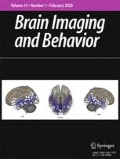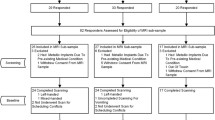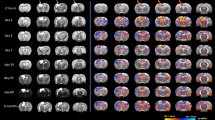Abstract
Traumatic brain injury (TBI) is a major cause of long-term cognitive deficits, even in mild TBI patients. Computerized cognitive training can help alleviate complaints and improve daily life functioning of TBI patients. However, the underlying biological mechanisms of cognitive training in TBI are not fully understood. In the present study, we utilised for the first time a touchscreen cognitive training system in a rat model of mild TBI. Moreover, we wanted to examine whether the beneficial effects of a cognitive training are task-dependent and selective in their target. Specifically, we examined the effect of two training tasks, i.e. the Paired Associate Learning (PAL) task targeting spatial memory functioning and 5-Choice Continuous Performance (5-CCP) task loading on attention and inhibition control, on the microstructural organization of the hippocampus and cingulum, respectively, using diffusion tensor imaging (DTI). Our findings revealed that the two training protocols induced similar effects on the diffusion MRI metrics. Further, in the TBI groups who received training microstructural organization in the hippocampus and cingulum improved (as denoted by increases in fractional anisotropy), while a worsening (i.e., increases in mean diffusivity and radial diffusivity) was found in the TBI control group. In addition, these alterations in diffusion MRI metrics coincided with improved performance on the training tasks in the TBI groups who received training. Our findings show the potential of DTI metrics as reliable measure to evaluate cognitive training in TBI patients and to facilitate future research investigating further improvement of cognitive training targeting deficits in spatial memory and attention.









Similar content being viewed by others
References
Barbelivien, A., Ruotsalainen, S., & Sirviö, J. (2001). Metabolic alterations in the prefrontal and cingulate cortices are related to behavioral deficits in a rodent model of attention-deficit hyperactivity disorder. Cerebral Cortex, 11, 1056–1063. https://doi.org/10.1093/cercor/11.11.1056.
Bari, A., Dalley, J. W., & Robbins, T. W. (2008). The application of the 5-choice serial reaction time task for the assessment of visual attentional processes and impulse control in rats. Nature Protocols, 3(5), 759–767. https://doi.org/10.1038/nprot.2008.41.
Bhandari, J., Daya, R., & Mishra, R. K. (2016). Improvements and important considerations for the 5-choice serial reaction time task-an effective measurement of visual attention in rats. Journal of Neuroscience Methods, 270, 17–29. https://doi.org/10.1016/j.jneumeth.2016.06.002.
Blumenfeld-Katzir, T., Pasternak, O., Dagan, M., & Assaf, Y. (2011). Diffusion MRI of structural brain plasticity induced by a learning and memory task. PLoS One, 6(6), e20678. https://doi.org/10.1371/journal.pone.0020678.
Bogdanova, Y., Yee, M. K., Ho, V. T., & Cicerone, K. D. (2016). Computerized cognitive rehabilitation of attention and executive function in acquired brain injury. The Journal of Head Trauma Rehabilitation, 31(6), 419–433. https://doi.org/10.1097/HTR.0000000000000203.
Bonzano, L., Tacchino, A., Brichetto, G., Roccatagliata, L., Dessypris, A., Feraco, P., Lopes de Carvalho, M. L., Battaglia, M. A., Mancardi, G. L., & Bove, M. (2014). Upper limb motor rehabilitation impacts white matter microstructure in multiple sclerosis. NeuroImage, 90, 107–116. https://doi.org/10.1016/j.neuroimage.2013.12.025.
Braeckman, K., Descamps, B., Pieters, L., Vral, A., Caeyenberghs, K., & Vanhove, C. (2019). Dynamic changes in hippocampal diffusion and kurtosis metrics following experimental mTBI correlate with glial reactivity. NeuroImage: Clinical, 21(August 2018), 101669. https://doi.org/10.1016/j.nicl.2019.101669.
Brayer, S. W., Ketcham, S., Zou, H., Hurwitz, M., Henderson, C., Fuletra, J., Kumar, K., Skidmore, E., Thiels, E., & Wagner, A. K. (2015). Developing a clinically relevant model of cognitive training after experimental traumatic brain injury. Neurorehabilitation and Neural Repair, 29(5), 483–495. https://doi.org/10.1177/1545968314550367.
Bussey, T. J., Padain, T. L., Skillings, E. A., Winters, B. D., Morton, A. J., & Saksida, L. M. (2008). The touchscreen cognitive testing method for rodents: how to get the best out of your rat. Learning & memory (Cold Spring Harbor, N.Y.), 15(7), 516–523. https://doi.org/10.1101/lm.987808.
Bussey, T. J., Holmes, A., Lyon, L., Mar, A. C., McAllister, K. A. L., Nithianantharajah, J., et al. (2012). New translational assays for preclinical modelling of cognition in schizophrenia: The touchscreen testing method for mice and rats. Neuropharmacology, 62(3), 1191–1203. https://doi.org/10.1016/j.neuropharm.2011.04.011.
Campden Instruments. (2011). 89541R- paired associates learning (PAL) task for rat touch screen systems and ABET II. In Instruction manual (pp. 1–49). Lafayette: Lafayette Instrument Company.
Campden Instruments. (2013). 89551-R - the continuous performance test with images ( image CPT / rCPT ) for rat touch screen systems and ABET II. In Instruction manual (pp. 1–93). Lafayette: Lafayette Instrument Company.
Catani, M., Dell’Acqua, F., & Thiebaut de Schotten, M. (2013). A revised limbic system model for memory, emotion and behaviour. Neuroscience and Biobehavioral Reviews, 37(8), 1724–1737. https://doi.org/10.1016/j.neubiorev.2013.07.001.
Chudasama, Y., Passetti, F., Rhodes, S. E. V., Lopian, D., Desai, A., & Robbins, T. W. (2003). Dissociable aspects of performance on the 5-choice serial reaction time task following lesions of the dorsal anterior cingulate, infralimbic and orbitofrontal cortex in the rat: Differential effects on selectivity, impulsivity and compulsivity. Behavioural Brain Research, 146(1–2), 105–119. https://doi.org/10.1016/j.bbr.2003.09.020.
Cicerone, K. D., Dahlberg, C., Malec, J. F., Langenbahn, D. M., Felicetti, T., Kneipp, S., Ellmo, W., Kalmar, K., Giacino, J. T., Harley, J. P., Laatsch, L., Morse, P. A., & Catanese, J. (2005). Evidence-based cognitive rehabilitation: Updated review of the literature from 1998 through 2002. Archives of Physical Medicine and Rehabilitation, 86(8), 1681–1692. https://doi.org/10.1016/j.apmr.2005.03.024.
de Lange, A.-M. G., Bråthen, A. C. S., Rohani, D. A., Grydeland, H., Fjell, A. M., & Walhovd, K. B. (2017). The effects of memory training on behavioral and microstructural plasticity in young and older adults. Human Brain Mapping, 38(11), 5666–5680. https://doi.org/10.1002/hbm.23756.
DeKosky, S. T., & Asken, B. M. (2017). Injury cascades in TBI-related neurodegeneration. Brain Injury, 31(9), 1177–1182. https://doi.org/10.1080/02699052.2017.1312528.
Fan, Y., Lin, K., Liu, H., Chen, Y., & Wu, C. (2015). Changes in structural integrity are correlated with motor and functional recovery after post-stroke rehabilitation. Restorative Neurology and Neuroscience, 33(6), 835–844. https://doi.org/10.3233/RNN-150523.
Fetta, J., Starkweather, A., & Gill, J. M. (2017). Computer-based cognitive rehabilitation interventions for traumatic brain injury. Journal of Neuroscience Nursing, 49(4), 235–240. https://doi.org/10.1097/JNN.0000000000000298.
Grossman, E. J., Jensen, J. H., Babb, J. S., Chen, Q., Tabesh, A., Fieremans, E., Xia, D., Inglese, M., & Grossman, R. I. (2013). Cognitive impairment in mild traumatic brain injury: a longitudinal diffusional kurtosis and perfusion imaging study. AJNR. American Journal of Neuroradiology, 34, 951–957. https://doi.org/10.3174/ajnr.A3358.
Hallock, H., Collins, D., Lampit, A., Deol, K., Fleming, J., & Valenzuela, M. (2016). Cognitive training for post-acute traumatic brain injury: A systematic review and meta-analysis. Frontiers in Human Neuroscience, 10(October). https://doi.org/10.3389/fnhum.2016.00537.
Han, K., Chapman, S. B., & Krawczyk, D. C. (2018). Neuroplasticity of cognitive control networks following cognitive training for chronic traumatic brain injury. NeuroImage: Clinical, 18(December 2017), 262–278. https://doi.org/10.1016/j.nicl.2018.01.030.
Hofstetter, S., & Assaf, Y. (2017). The rapid development of structural plasticity through short water maze training: A DTI study. NeuroImage, 155(May), 202–208. https://doi.org/10.1016/j.neuroimage.2017.04.056.
Hofstetter, S., Tavor, I., Tzur Moryosef, S., & Assaf, Y. (2013). Short-term learning induces white matter plasticity in the fornix. The Journal of neuroscience : the official journal of the Society for Neuroscience, 33(31), 12844–12850. https://doi.org/10.1523/JNEUROSCI.4520-12.2013.
Hvoslef-Eide, M., Nilsson, S. R. O., Hailwood, J. M., Robbins, T. W., Saksida, L. M., Mar, A. C., & Bussey, T. J. (2018). Effects of anterior cingulate cortex lesions on a continuous performance task for mice. Brain and Neuroscience Advances, 2, 239821281877296. https://doi.org/10.1177/2398212818772962.
Kellner, E., Dhital, B., Kiselev, V. G., & Reisert, M. (2016). Gibbs-ringing artifact removal based on local subvoxel-shifts. Magnetic Resonance in Medicine, 76(5), 1574–1581. https://doi.org/10.1002/mrm.26054.
Kim, C. H., Heath, C. J., Kent, B. A., Bussey, T. J., & Saksida, L. M. (2015). The role of the dorsal hippocampus in two versions of the touchscreen automated paired associates learning (PAL) task for mice. Psychopharmacology, 232(21–22), 3899–3910. https://doi.org/10.1007/s00213-015-3949-3.
Korley, F. K., Kelen, G. D., Jones, C. M., & Diaz-Arrastia, R. (2016). Emergency department evaluation of traumatic brain injury in the United States, 2009–2010. The Journal of Head Trauma Rehabilitation, 31(6), 379–387. https://doi.org/10.1097/HTR.0000000000000187.
Leemans, A., Jeurissen, B., Sijbers, J., & Jones, D. (2009). ExploreDTI: a graphical toolbox for processing, analyzing, and visualizing diffusion MR data. Proceedings on International Society for Magnetic Resonance in Medicine, 17, 3537.
Loening, A. M., & Gambhir, S. S. (2003). AMIDE: A free software tool for multimodality medical image analysis. Molecular Imaging, 2(3), 131–137. https://doi.org/10.1162/153535003322556877.
Mar, A. C., Horner, A. E., Nilsson, S. R. O., Alsiö, J., Kent, B. A., Kim, C. H., et al. (2013). The touchscreen operant platform for assessing executive function in rats and mice. Nature Protocols, 8(10), 1985–2005. https://doi.org/10.1038/nprot.2013.123.
Marmarou, A., Foda, M. A. A.-E., van den Brink, W., Campbell, J., Kita, H., & Demetriadou, K. (1994). A new model of diffuse brain injury in rats. Journal of Neurosurgery, 80(2), 291–300. https://doi.org/10.3171/jns.1994.80.2.0291.
Melby-Lervåg, M., Redick, T. S., & Hulme, C. (2016). Working memory training does not improve performance on measures of intelligence or other measures of “Far Transfer”. Perspectives on Psychological Science, 11(4), 512–534. https://doi.org/10.1177/1745691616635612.
Metzler-Baddeley, C., Foley, S., de Santis, S., Charron, C., Hampshire, A., Caeyenberghs, K., & Jones, D. K. (2017). Dynamics of white matter plasticity underlying working memory training: Multimodal evidence from diffusion MRI and Relaxometry. Journal of Cognitive Neuroscience, 29(9), 1509–1520. https://doi.org/10.1162/jocn_a_01127.
Minen, M., Jinich, S., & Vallespir Ellett, G. (2019). Behavioral therapies and mind-body interventions for posttraumatic headache and post-concussive symptoms: A systematic review. Headache: The Journal of Head and Face Pain, 59(2), 151–163. https://doi.org/10.1111/head.13455.
Mychasiuk, R., Hehar, H., & Esser, M. J. (2015). A mild traumatic brain injury (mTBI) induces secondary attention-deficit hyperactivity disorder-like symptomology in young rats. Behavioural Brain Research, 286, 285–292. https://doi.org/10.1016/j.bbr.2015.03.010.
Nichols, J. N., Hagan, K. L., & Floyd, C. L. (2017). Evaluation of touchscreen chambers to assess cognition in adult mice: Effect of training and mild traumatic brain injury. Journal of Neurotrauma, 34(17), 2481–2494. https://doi.org/10.1089/neu.2017.4998.
Peeters, W., van den Brande, R., Polinder, S., Brazinova, A., Steyerberg, E. W., Lingsma, H. F., & Maas, A. I. R. (2015). Epidemiology of traumatic brain injury in Europe. Acta Neurochirurgica, 157(10), 1683–1696. https://doi.org/10.1007/s00701-015-2512-7.
Radabaugh, H. L., LaPorte, M. J., Greene, A. M., Bondi, C. O., Lajud, N., Radabaugh, H. L., et al. (2017). Refining environmental enrichment to advance rehabilitation based research after experimental traumatic brain injury. Experimental Neurology, 294, 12–18. https://doi.org/10.1016/j.expneurol.2017.04.013.
Sagi, Y., Tavor, I., Hofstetter, S., Tzur-Moryosef, S., Blumenfeld-Katzir, T., & Assaf, Y. (2012). Learning in the fast lane: New insights into neuroplasticity: Supplement. Neuron, 73(6), 1195–1203. https://doi.org/10.1016/j.neuron.2012.01.025.
Salmond, C. H., Menon, D. K., Chatfield, D. A., Williams, G. B., Pena, A., Sahakian, B. J., & Pickard, J. D. (2006). Diffusion tensor imaging in chronic head injury survivors: Correlations with learning and memory indices. NeuroImage, 29(1), 117–124. https://doi.org/10.1016/j.neuroimage.2005.07.012.
Sampaio-Baptista, C., Khrapitchev, A. A., Foxley, S., Schlagheck, T., Scholz, J., Jbabdi, S., DeLuca, G. C., Miller, K. L., Taylor, A., Thomas, N., Kleim, J., Sibson, N. R., Bannerman, D., & Johansen-Berg, H. (2013). Motor skill learning induces changes in white matter microstructure and myelination. Journal of Neuroscience, 33(50), 19499–19503. https://doi.org/10.1523/JNEUROSCI.3048-13.2013.
Scholz, J., Niibori, Y., W Frankland, P., & P Lerch, J. (2015). Rotarod training in mice is associated with changes in brain structure observable with multimodal MRI. NeuroImage, 107, 182–189. https://doi.org/10.1016/j.neuroimage.2014.12.003.
Shepherd, A., Tyebji, S., Hannan, A. J., & Burrows, E. L. (2016). Translational assays for assessment of cognition in rodent models of Alzheimer’s disease and dementia. Journal of Molecular Neuroscience, 60(3), 371–382. https://doi.org/10.1007/s12031-016-0837-1.
Shipstead, Z., Hicks, K. L., & Engle, R. W. (2012). Cogmed working memory training: Does the evidence support the claims? Journal of Applied Research in Memory and Cognition, 1(3), 185–193. https://doi.org/10.1016/j.jarmac.2012.06.003.
Silverberg, N. D., Panenka, W. J., & Iverson, G. L. (2018). Work productivity loss after mild traumatic brain injury. Archives of Physical Medicine and Rehabilitation, 99(2), 250–256. https://doi.org/10.1016/j.apmr.2017.07.006.
Talpos, J. C., Winters, B. D., Dias, R., Saksida, L. M., & Bussey, T. J. (2009). A novel touchscreen-automated paired-associate learning (PAL) task sensitive to pharmacological manipulation of the hippocampus: a translational rodent model of cognitive impairments in neurodegenerative disease. Psychopharmacology, 205(1), 157–168. https://doi.org/10.1007/s00213-009-1526-3.
The American Congress of Rehabilitation Medicine. (1993). Definition of mild traumatic brain injury. The Journal of Head Trauma Rehabilitation, 8(3), 86–87. https://doi.org/10.1097/00001199-199309000-00010.
Thomas, R. E., Alves, J., Vaska Mlis, M. M., & Magalhaes, R. (2017). Therapy and rehabilitation of mild brain injury/concussion: Systematic review. Restorative Neurology and Neuroscience, 35(6), 643–666. https://doi.org/10.3233/RNN-170761.
Veraart, J., Sijbers, J., Sunaert, S., Leemans, A., & Jeurissen, B. (2013). Weighted linear least squares estimation of diffusion MRI parameters: Strengths, limitations, and pitfalls. NeuroImage, 81, 335–346. https://doi.org/10.1016/j.neuroimage.2013.05.028.
Veraart, J., Fieremans, E., & Novikov, D. S. (2016a). Diffusion MRI noise mapping using random matrix theory. Magnetic Resonance in Medicine, 76(5), 1582–1593. https://doi.org/10.1002/mrm.26059.
Veraart, J., Novikov, D. S., Christiaens, D., Ades-aron, B., Sijbers, J., & Fieremans, E. (2016b). Denoising of diffusion MRI using random matrix theory. NeuroImage, 142, 394–406. https://doi.org/10.1016/j.neuroimage.2016.08.016.
Vonder Haar, C., Lam, F. C. W., Adams, W. K., Riparip, L. K., Kaur, S., Muthukrishna, M., Rosi, S., & Winstanley, C. A. (2016). Frontal traumatic brain injury in rats causes long-lasting impairments in impulse control that are differentially sensitive to Pharmacotherapeutics and associated with chronic Neuroinflammation. ACS Chemical Neuroscience, 7(11), 1531–1542. https://doi.org/10.1021/acschemneuro.6b00166.
Young, J. W., Light, G. A., Marston, H. M., Sharp, R., & Geyer, M. A. (2009). The 5-choice continuous performance test: Evidence for a translational test of vigilance for mice. PLoS One, 4(1), e4227. https://doi.org/10.1371/journal.pone.0004227.
Yuan, W., Treble-Barna, A., Sohlberg, M. M., Harn, B., & Wade, S. L. (2017). Changes in structural connectivity following a cognitive intervention in children with traumatic brain injury. Neurorehabilitation and Neural Repair, 31(2), 190–201. https://doi.org/10.1177/1545968316675430.
Yuh, E. L., Cooper, S. R., Mukherjee, P., Yue, J. K., Lingsma, H. F., Gordon, W. A., Valadka, A. B., Okonkwo, D. O., Schnyer, D. M., Vassar, M. J., Maas, A. I. R., Manley, G. T., and the Track-TBI Investigators including, Casey, S. S., Cheong, M., Dams-O'Connor, K., Hricik, A. J., Inoue, T., Menon, D. K., Morabito, D. J., Pacheco, J. L., Puccio, A. M., & Sinha, T. K. (2014). Diffusion tensor imaging for outcome prediction in mild traumatic brain injury: A TRACK-TBI study. Journal of Neurotrauma, 31(17), 1457–1477. https://doi.org/10.1089/neu.2013.3171.
Funding
This work was supported by the Research Foundation – Flanders (FWO) [grant number G027815 N].
Author information
Authors and Affiliations
Corresponding author
Ethics declarations
Conflict of interest
Author K. Braeckman declares that she has no conflict of interest, B. Descamps declares that she has no conflict of interest, C. Vanhove declares that he has no conflict of interest and K. Caeyenberghs declares that she has no conflict of interest.
Ethical approval
All applicable international, national, and/or institutional guidelines for the care and use of animals were followed.
Additional information
Publisher’s note
Springer Nature remains neutral with regard to jurisdictional claims in published maps and institutional affiliations.
Rights and permissions
About this article
Cite this article
Braeckman, K., Descamps, B., Vanhove, C. et al. Exploratory relationships between cognitive improvements and training induced plasticity in hippocampus and cingulum in a rat model of mild traumatic brain injury: a diffusion MRI study. Brain Imaging and Behavior 14, 2281–2294 (2020). https://doi.org/10.1007/s11682-019-00179-4
Published:
Issue Date:
DOI: https://doi.org/10.1007/s11682-019-00179-4




